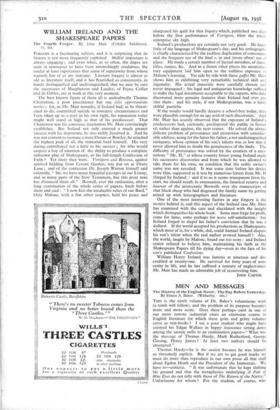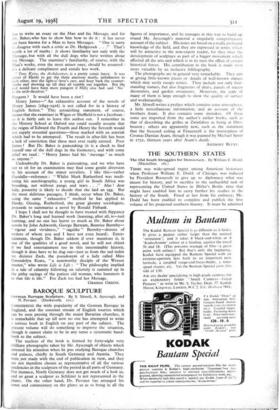The History of the English Novel: The Day Before Yesterday.
By Ernest A. Baker. (iWitherby. 16s.)
MEN AND MESSAGES
The History of the English Novel: The Day Before Yesterday. By Ernest A. Baker. (iWitherby. 16s.)
THIS is the ninth volume of Dr. Baker's voluminous work (a tenth will follow), and the problem of its purpose becomes more and more acute. Does there perhaps exist in one of our more remote industrial cities an extension course in English literature for which these grim and gritty volumes serve as text-books ? I see a poor student who might have enjoyed his Edgar Wallace in happy innocence sitting down among the satanic mills to an examination paper—" What was the message of Thomas Hardy, Mark Rutherford, George dissing, Henry James ? At least two authors should be attempted."
Thomas Hardy—he is the easiest because he was himself so tiresomely explicit. But if we are to get good marks we must do more than reproduce in our own prose all that stuff about Egdon Heath and the President of the Immortals. We have to—criticise. " It was unfortunate that he kept shifting his ground and that the metaphysics underlying A Pair of Blue Eyes do not tally with those of The Return of the Native." Unfortunate for whom ? For the student, of course, who has to write- an essay on the Man and his Message, and for Dr. Baker, who has to show him how to do it : it has never vet been known for a Man to have Messages. " One is sorry to disagree with such a critic as Dr. Hedgecock . . ." That's worth a lot of marks : it shows familiarity not only with the Message, but with all the dull dogs who have written about the Message. The examiner's familiarity, of course, with the Man's works, even the most minor ones, should be assumed : it's a delicate compliment and entails less work.
" Tony Kytes, the Archdeceiver, is a pretty comic fancy. It was clever of Hardy to get the three amorous maids, unbeknown to each other, into the light-o'-love's cart, and keep back the counter- stroke and showing up till they all tumble out together. But the end would have been more pungent if Milly also had said ' No ' to the arch-deceiver."
Pungent ? It would have been a riot !
Henry James—" An exhaustive account of the novels of Henry James (1843-1916) is not called for in a history of English fiction." This astonishing statement, of . course, means that the examiner in Wigan or Sheffield is not a Jacobean : so it is fairly safe to leave this author out. I remember in the History School at Oxford one could usually assume that the reigns of.Edward the Fourth and Henry the Seventh would not supply essential questions—those marked with an asterisk which bad to be attempted. The result in after-life has been a lack of conviction that these men ever really existed. Poor James ! But Dr. Baker is painstaking (it is a shock to find oneself one of the dull dogs in the footnotes), and with some
relief we read : " Henry James had his ' message ' as much as anyone."
Undoubtedly Dr. Baker is painstaking, and we who have not to sit for an examination may find some gentle diversion in his account of the minor novelists. I like this—rather Guedalla—reference " Whilst Mark Rutherford was medi- tating his autobiography, a young girl in South Africa was brooding, not without pangs and tears . ." Alas ! dear lady, posterity is likely to decide that she laid an egg. But the most delirious passages, I think, occur when Dr. Baker, using the same " exhaustive " method he has applied to Hardy, Gissing, Rutherford, the great gloomy sociologists, proceeds to summarise a novel by Ronald Firbank.
I hope I shall not be thought to have treated with flippancy Dr. Baker's long and learned work (learning, after all, is—just learning, and no one has learnt so much as Dr. Baker about novels by John Ackworth, George Bartram, Beatrice Barmby-- " vigour and vividness," " sagalike " Barmby—dozens of
writers of whom you and I have not even heard). Enter- tainment, though Dr. Baker seldom if ever mentions it, is one of the qualities of a good novel, and he will not object if we find entertainment too in this interminable history, though it does have to be dug out—just as from the sad index we disinter Zack, the pseudonym of a lady called Miss Gwendolyn Keats, "a noteworthy disciple of the Wessex master," who wrote Life 1,s Life " The philosophy implied in a tale of calamity following on calamity is summed up in the pithy sayings of the patient old woman, who hammers it in that life is life." For Zack too had her Message.
GRAHAM GREENE.







































 Previous page
Previous page